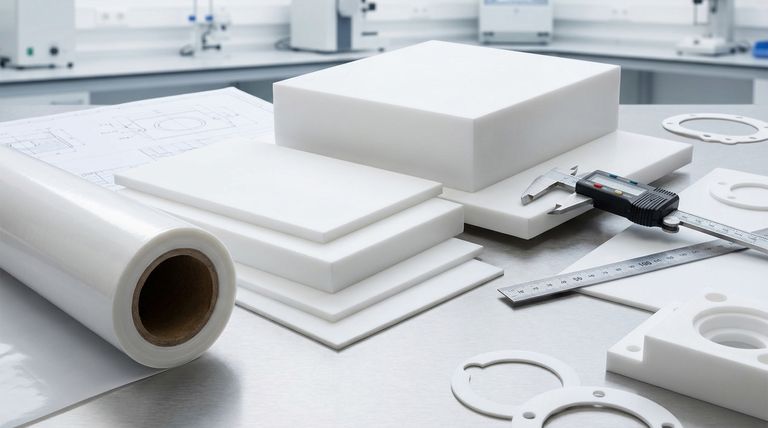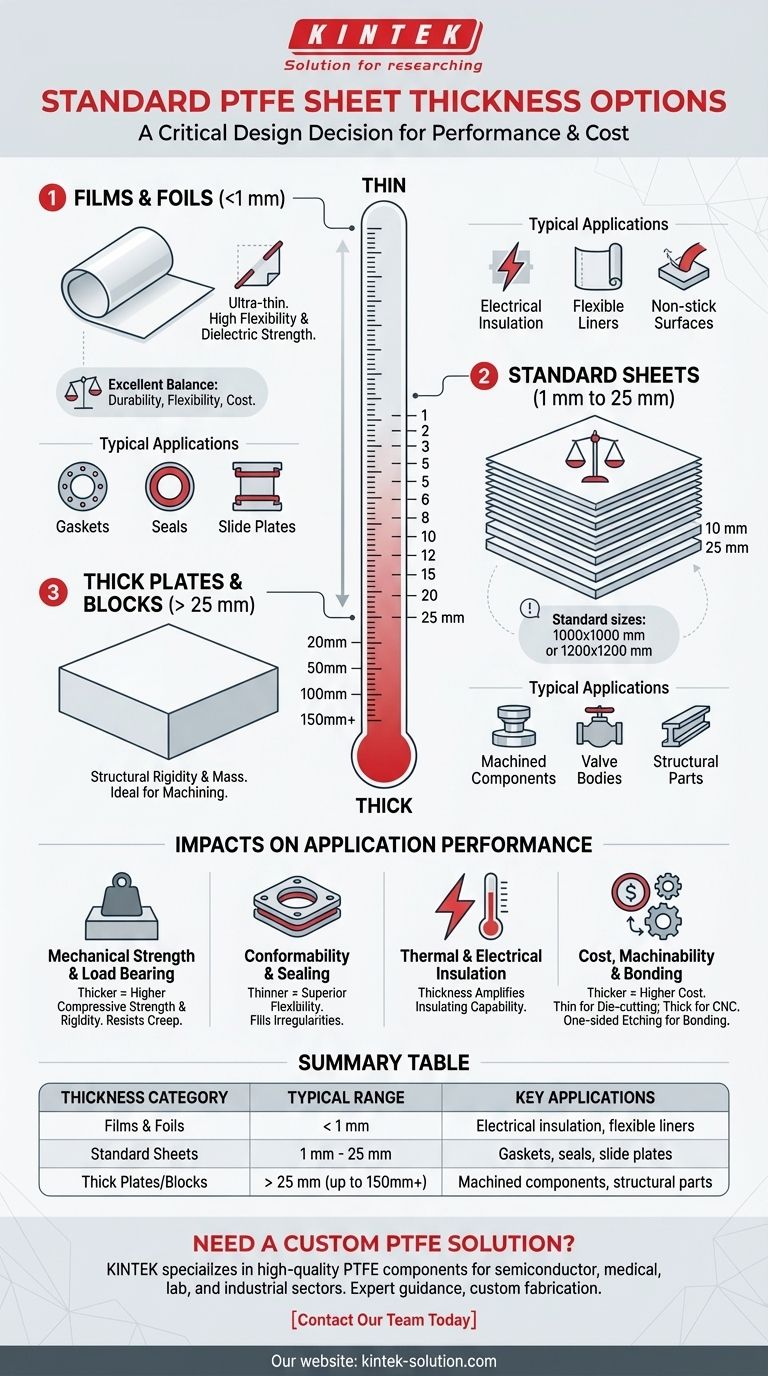In short, standard metric thicknesses for PTFE sheets typically include 1mm, 2mm, 3mm, 5mm, 6mm, 8mm, 10mm, 12mm, 15mm, 20mm, and 25mm. However, the available range is much wider, extending from thin films below 1mm to thick plates over 100mm, with custom dimensions readily available.
The specific thickness you choose is not just a matter of availability; it is a critical design decision. The right thickness directly influences the material's mechanical strength, flexibility, insulating properties, and overall cost for your application.

A Closer Look at Thickness Ranges
While a list of "standard" sizes is a good starting point, it's more practical to think of PTFE thickness in terms of functional categories. Each category is suited for a different set of engineering challenges.
Films and Foils (Below 1 mm)
For applications requiring thickness below 1 mm (approximately 0.040 inches), you are typically working with PTFE film or foil, not sheet.
These ultra-thin materials are prized for their flexibility and superior dielectric strength. They are most often used as high-performance electrical insulators, flexible liners for chemical tanks, or non-stick surfaces.
Standard Sheets (1 mm to 25 mm)
This is the most common range for general-purpose PTFE sheets. Common imperial equivalents fall between approximately 1/16" and 1".
These are the workhorses for applications like gaskets, seals, and slide plates. They offer an excellent balance of moderate flexibility, good durability, and manageable cost. Standard sheet sizes are often 1000x1000 mm or 1200x1200 mm.
Thick Plates and Blocks (Above 25 mm)
Once you exceed 25 mm (around 1 inch), you are in the realm of PTFE plates or blocks. These can be manufactured up to 150 mm (or ~6 inches) thick.
Their primary advantage is structural rigidity and mass. These thick blocks are the ideal starting material for machining complex components like valve bodies, insulators, or custom structural parts that require PTFE's unique properties.
How Thickness Impacts Application Performance
Choosing a thickness is a technical trade-off. A thicker sheet is not inherently better; it is simply different. Understanding these differences is key to a successful design.
Mechanical Strength and Load Bearing
Thickness is directly correlated to compressive strength and rigidity. A thicker PTFE plate will resist deformation and "creep" under a heavy, static load far better than a thin sheet.
This makes thick plates essential for load-bearing applications like bridge bearing pads or heavy machinery slide ways.
Conformability and Sealing
Conversely, thinner sheets offer superior flexibility and conformability. When creating a gasket to seal two imperfect flange faces, a thinner, more pliable sheet will better fill surface irregularities to create a tight seal.
Using a sheet that is too thick for a gasketing application can result in an improper seal and potential leaks, as it may be too rigid to conform.
Thermal and Electrical Insulation
While PTFE is an excellent insulator in any form, thickness amplifies its insulating capability. For high-voltage electrical applications or thermal breaks, a thicker material provides a greater margin of safety and performance.
Understanding the Trade-offs
Selecting a material is always an exercise in balancing competing priorities. PTFE is no different.
Cost vs. Performance
The most obvious trade-off is cost. PTFE is priced by weight, so a 10 mm thick sheet will cost roughly twice as much as a 5 mm sheet of the same dimensions. Over-specifying thickness is a common and costly mistake.
Machinability and Fabrication
Your intended fabrication method dictates the ideal thickness. Thick blocks are perfect for CNC machining, while thin sheets (1-6 mm) are ideal for die-cutting or waterjet cutting into gaskets and other flat parts.
One-Sided Etching for Bonding
For applications requiring bonding PTFE to another surface (like steel or aluminum), the sheet can be chemically etched on one side. This process alters the slick surface to allow adhesives to form a strong bond. This is an option available on most thicknesses but is critical to specify when ordering.
Making the Right Choice for Your Goal
Base your selection on the primary demand of your application.
- If your primary focus is sealing or gasketing: Choose a thinner sheet (typically 1 mm to 3 mm) that provides the necessary conformability for your surfaces.
- If your primary focus is low-friction sliding or wear resistance: Select a medium-thickness sheet (3 mm to 12 mm) for a good balance of durability and cost.
- If your primary focus is creating a machined part: Start with a thick plate or block (>20 mm) that provides enough material for the final component's dimensions and structural integrity.
- If your primary focus is electrical insulation or a thin liner: Specify PTFE film or foil (typically below 1 mm) to get the required flexibility and dielectric properties.
Ultimately, selecting the correct PTFE thickness is the foundational step in leveraging its unique chemical and physical properties for your project.
Summary Table:
| Thickness Category | Typical Range | Key Applications |
|---|---|---|
| Films & Foils | < 1 mm | Electrical insulation, flexible liners |
| Standard Sheets | 1 mm - 25 mm | Gaskets, seals, slide plates |
| Thick Plates/Blocks | > 25 mm (up to 150mm+) | Machined components, structural parts |
Need a Custom PTFE Solution?
Selecting the precise PTFE thickness is critical for your component's performance, durability, and cost-efficiency. KINTEK specializes in manufacturing high-quality PTFE components—including seals, liners, and labware—for the semiconductor, medical, laboratory, and industrial sectors.
We provide expert guidance on material selection and offer custom fabrication from prototypes to high-volume orders, ensuring you get the perfect fit for your application.
Contact our team today to discuss your project requirements and get a quote.
Visual Guide

Related Products
- Custom PTFE Parts Manufacturer for Teflon Containers and Components
- Custom PTFE Parts Manufacturer for Teflon Parts and PTFE Tweezers
- Custom PTFE Sealing Tapes for Industrial and High Tech Applications
- Customizable PTFE Seals Filter Holders for Versatile Applications
- Custom PTFE Sleeves and Hollow Rods for Advanced Applications
People Also Ask
- What are the disadvantages of using PTFE O-Rings? When Rigidity and Lack of Elasticity Cause Leaks
- Why is Teflon's heat resistance important in food processing? Ensure Safety and Efficiency
- What are the different types of Teflon bearings available? Find the Right PTFE Bearing for Your Application
- What are the key properties of Polytetrafluoroethylene (PTFE) sheets? Unlock Superior Performance in Demanding Applications
- What are the key properties of PTFE balls? Unmatched Chemical Resistance and Non-Stick Performance
- What is the conclusion regarding the use of PTFE gaskets? Maximize Seal Performance with the Right PTFE Type
- Why are PTFE heat press sheets essential for custom printing? Achieve Flawless, Professional Results
- What are the properties of PTFE encapsulated O-rings? Superior Sealing for Harsh Environments



















